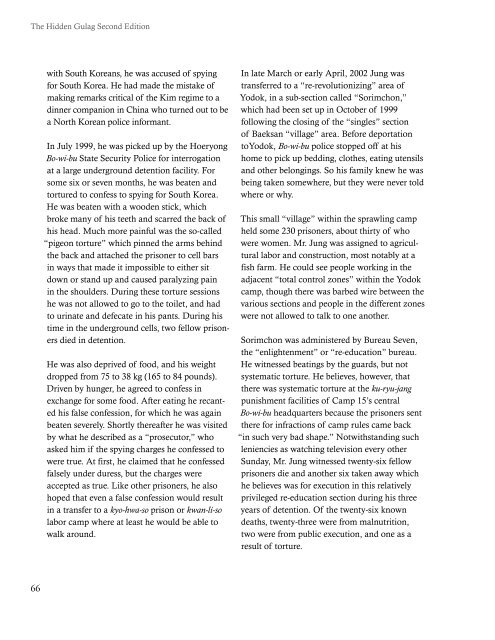The Hidden Gulag - US Committee for Human Rights in North Korea
The Hidden Gulag - US Committee for Human Rights in North Korea
The Hidden Gulag - US Committee for Human Rights in North Korea
You also want an ePaper? Increase the reach of your titles
YUMPU automatically turns print PDFs into web optimized ePapers that Google loves.
<strong>The</strong> <strong>Hidden</strong> <strong>Gulag</strong> Second Editionwith South <strong>Korea</strong>ns, he was accused of spy<strong>in</strong>g<strong>for</strong> South <strong>Korea</strong>. He had made the mistake ofmak<strong>in</strong>g remarks critical of the Kim regime to ad<strong>in</strong>ner companion <strong>in</strong> Ch<strong>in</strong>a who turned out to bea <strong>North</strong> <strong>Korea</strong>n police <strong>in</strong><strong>for</strong>mant.In July 1999, he was picked up by the HoeryongBo-wi-bu State Security Police <strong>for</strong> <strong>in</strong>terrogationat a large underground detention facility. Forsome six or seven months, he was beaten andtortured to confess to spy<strong>in</strong>g <strong>for</strong> South <strong>Korea</strong>.He was beaten with a wooden stick, whichbroke many of his teeth and scarred the back ofhis head. Much more pa<strong>in</strong>ful was the so-called“pigeon torture” which p<strong>in</strong>ned the arms beh<strong>in</strong>dthe back and attached the prisoner to cell bars<strong>in</strong> ways that made it impossible to either sitdown or stand up and caused paralyz<strong>in</strong>g pa<strong>in</strong><strong>in</strong> the shoulders. Dur<strong>in</strong>g these torture sessionshe was not allowed to go to the toilet, and hadto ur<strong>in</strong>ate and defecate <strong>in</strong> his pants. Dur<strong>in</strong>g histime <strong>in</strong> the underground cells, two fellow prisonersdied <strong>in</strong> detention.He was also deprived of food, and his weightdropped from 75 to 38 kg (165 to 84 pounds).Driven by hunger, he agreed to confess <strong>in</strong>exchange <strong>for</strong> some food. After eat<strong>in</strong>g he recantedhis false confession, <strong>for</strong> which he was aga<strong>in</strong>beaten severely. Shortly thereafter he was visitedby what he described as a “prosecutor,” whoasked him if the spy<strong>in</strong>g charges he confessed towere true. At first, he claimed that he confessedfalsely under duress, but the charges wereaccepted as true. Like other prisoners, he alsohoped that even a false confession would result<strong>in</strong> a transfer to a kyo-hwa-so prison or kwan-li-solabor camp where at least he would be able towalk around.In late March or early April, 2002 Jung wastransferred to a “re-revolutioniz<strong>in</strong>g” area ofYodok, <strong>in</strong> a sub-section called “Sorimchon,”which had been set up <strong>in</strong> October of 1999follow<strong>in</strong>g the clos<strong>in</strong>g of the “s<strong>in</strong>gles” sectionof Baeksan “village” area. Be<strong>for</strong>e deportationtoYodok, Bo-wi-bu police stopped off at hishome to pick up bedd<strong>in</strong>g, clothes, eat<strong>in</strong>g utensilsand other belong<strong>in</strong>gs. So his family knew he wasbe<strong>in</strong>g taken somewhere, but they were never toldwhere or why.This small “village” with<strong>in</strong> the sprawl<strong>in</strong>g campheld some 230 prisoners, about thirty of whowere women. Mr. Jung was assigned to agriculturallabor and construction, most notably at afish farm. He could see people work<strong>in</strong>g <strong>in</strong> theadjacent “total control zones” with<strong>in</strong> the Yodokcamp, though there was barbed wire between thevarious sections and people <strong>in</strong> the different zoneswere not allowed to talk to one another.Sorimchon was adm<strong>in</strong>istered by Bureau Seven,the “enlightenment” or “re-education” bureau.He witnessed beat<strong>in</strong>gs by the guards, but notsystematic torture. He believes, however, thatthere was systematic torture at the ku-ryu-jangpunishment facilities of Camp 15’s centralBo-wi-bu headquarters because the prisoners sentthere <strong>for</strong> <strong>in</strong>fractions of camp rules came back“<strong>in</strong> such very bad shape.” Notwithstand<strong>in</strong>g suchleniencies as watch<strong>in</strong>g television every otherSunday, Mr. Jung witnessed twenty-six fellowprisoners die and another six taken away whichhe believes was <strong>for</strong> execution <strong>in</strong> this relativelyprivileged re-education section dur<strong>in</strong>g his threeyears of detention. Of the twenty-six knowndeaths, twenty-three were from malnutrition,two were from public execution, and one as aresult of torture.66



